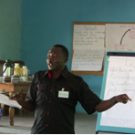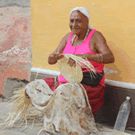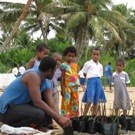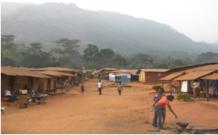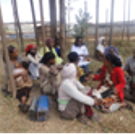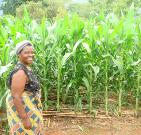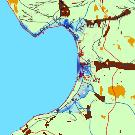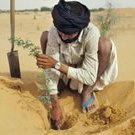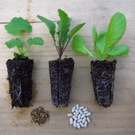| 1. Ethiopia | Water/Nutrition/HIV | Drip Irrigation | Urban Agriculture | Grey Water | |
 |
Goshu Worku (Ethiopia), & James Yasona (South Sudan) are working in urban agriculture with 270 children & 150 women suffering from shortages of household water and food shortages from a lack of agricultural water and adequate irrigation. Many of these individuals are living with HIV/AIDS—including orphans, vulnerable children & women.
|
Goshu and James developed a solution-oriented project that includes:
- Safe Water & Nutrition for people living with HIV/AIDS
- Water use management plan
- Climate smart agricultural practices program
- Family garden and nutrition program
- Community youth activity program
| 2. Southern Uganda | Water Scarcity | Drought | Water Management | Participatory Mapping |
|
 |
Elijah Kajubi (Uganda), Siobhan Girling (UK), Jeff DeBlieu (US) & Alba Perez (Vietnam) are working with 300 families in SW Uganda. These agricultural families suffer from widespread malnutrition caused by climate variability—including extreme drought that reduces crop yields & negatively impacts livestock.
|
| 3. Nigeria | Vulnerabilities | Irrigation | Coping Strategies | Drought |
|
 |
Talitha Tukura (Nigeria), Orleans Mfune (Zambia) and Conrad Otterness (US) spent eight months in 2011 working with 200 families in Kwall, Nigeria who are suffering from chronic food shortages caused by a lack of access to water and from climate variability that impacts harvests.
|
| 4. Water from Rocks | |
 |
A video on the water channel called “Water from Rocks” has been released. It is about using rock formations as a basis for collecting and storing water from rainstorms in arid locations.
|
 |
Solutionsforwater.org has posted more than a thousand solutions on their platform from more than 120 countries—showing the great mobilization from actors in the water community and in civil society pushing to improve access to water and sanitation.
Solutionsforwater.org is a project of the 6th World Water Forum to be held in Marseille, France, March 12-17. |
 |
What Works in International Development? Sustainable projects are based upon a series of building block activities that have shown scientific evidence of having worked, and that provide effective grassroots solutions to needs identified by rural communities. Take a look below to see what is available to members.
|
Free Membership Benefits. As a member you will have access to a collection of resources for increasing impact in the field. Read more about membership benefits.
- Community workshop lesson plans for 150 development activities
- Access to over 200 manuals & field guides of development activities organized by sector
- Access to specialized climate change related manuals, field guides & academic papers
- Background information on the 12 traditional development sectors
- Monthly newsletter with case studies & detailed information of field projects
|
Here are a range of solutions in the form of programs and activities that past students have used successfully in addressing Project challenges. Feel free to use them, modify them, or develop your own solutions instead. Many of the programs are highly specific to one student’s project and will need to be adapted to fit yours. Many of the programs have multiple activities; these are to give you options for customizing your own programs: edit the activities down as you see fit for your project.
|
|
1. Community-Based Adaptation: 300 Hands-On Field Activities.
2. Student Countries and Project Challenges.

